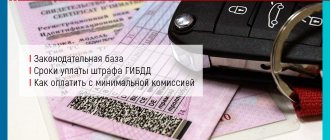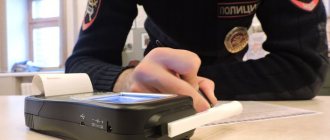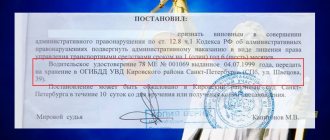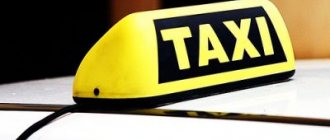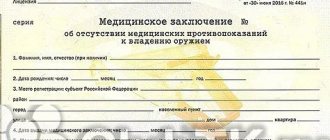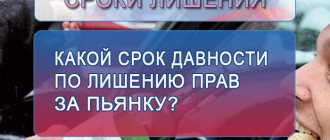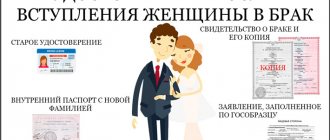A drunk driver poses a danger not only to himself, but also to other road users. Punishment for drunkenness and transfer of control of a vehicle to a person who is intoxicated is provided for in the Code of Administrative Offenses of Russia. According to Art. 12.8 the court has the right to deprive the driver of his license and impose a large fine. Drivers who consider double punishment excessive are looking for an opportunity to take away their license without paying an administrative fine of 30,000 rubles. The law provides for deferred and installment payment options. In addition, in some cases, driving licenses are restricted by bailiffs.
Is there a way not to pay a fine of 30,000 rubles
Punishment for driving a vehicle while intoxicated is an integral part of the sanction under Art. 12.8 Code of Administrative Offenses of Russia. You can take away your license without paying a fine of 30,000 rubles only in cases where a technical error has occurred and there is no information about the imposition of a penalty in the traffic police database. It is possible not to pay 30 thousand rubles upon deprivation of a license if it was not previously collected, the statute of limitations has expired, and the punished driver does not plan to regain the right to drive vehicles.
Important! After the expiration of the period of deprivation of rights, in order to return them, you must pay a fine, provide a medical certificate and pass an exam.
Management after the expiration of the period of deprivation, if you have not returned your license and have not paid a fine of 30,000 rubles
If you got behind the wheel of a car after the expiration of the period of deprivation of your license, but the driver’s license itself was not taken away from the traffic police, then as of 2021 you will be subject to a fine. Moreover, regardless of the reasons that you did not have the license - if you simply did not want to return it after deprivation or if you did not fulfill the conditions for such a return. We will talk about what the fine should be according to the law, and what is imposed in practice, in this article.
Statute of limitations for fines for deprivation of rights
The statute of limitations for collecting fines is determined by 31.9 of the Code of Administrative Offenses of the Russian Federation, and for those punished under Art. 12.8 of the Administrative Code is 24 months. There is a misconception that after two years the driver is exempt from paying.
The statute of limitations for drunk driving penalties depends on whether the penalty order was enforced. If the fined driver evaded payment and enforcement proceedings were initiated against him, the two-year statute of limitations is suspended while the evader is being searched for.
We talked in detail about what will happen if you hand over the steering wheel to a person without a license in this article.
How long does it take for traffic police fines to expire?
So, if you don’t pay traffic police fines, they will expire—the data is current as of December 6, 2021. This happens 2 years after the date of entry into force of the decision on such a fine. Article 31.9 of the Code of Administrative Offenses tells us this:
Article 31.9. The limitation period for the execution of a decision to impose an administrative penalty.
1. A resolution on the imposition of an administrative penalty is not subject to execution if this resolution has not been enforced within two years from the date of its entry into legal force.
As you can see, everything is simple! Execution of a punishment is the payment of a fine, and if the fine has not been executed within two years from the date it entered into legal force, it expires.
But what is the effective date? According to the same Code of Administrative Offenses (Article 31.1), this is the date on which the period for appealing the decision on a fine expires. That is, first the inspector makes a decision (namely a decision, not a protocol), then there is a period during which this decision can be appealed, and after this period the decision comes into force, and it can no longer be appealed. The appeal period for almost all traffic fines is 10 days. But this period is interrupted if you appeal the decision.
If the decision was made not by the inspector, but by means of automatic recording, then the period for appeal begins after the driver has been properly notified of the punishment. Such notification is a registered letter with a copy of the resolution received by the driver at his place of registration if he did not evade receiving it.
Example: citizen Ivanov committed a violation on June 3, 2021 - he was driving at an excessive speed, which was recorded by a self-driving camera. As a result, a resolution was drawn up against him, issued on June 5 of the same year, and a copy of the resolution was sent to Ivanov by mail. Ivanov received this copy on June 14, 2021, and did not appeal this fine.
As a result, we get the following timing:
- The date of entry into force of the resolution is June 24, 2016 (date of receipt of the copy + 10 days for appeal).
- The expiration date for the fine is June 24, 2018.
It seems like nothing complicated, doesn’t it?! But in reality, fines are burned in this way very rarely. The fact is that the state takes good care of replenishing the budget, so it will not allow you to simply not pay a fine - this will be discussed below.
Responsibility for late payment
By ignoring the payment deadlines, the driver aggravates his situation and violates the Code of Administrative Offences, Art. 20.15. If funds are not received within 70 days after the penalty is imposed, the law provides:
- doubling the amount of payments;
- arrest for up to 15 days;
- involvement in compulsory work for up to 50 hours.
Debt on fines leads to a ban on crossing the state border. Debt collection is the responsibility of the FSSP. To ensure repayment, bailiffs have the right to seize property and sell it to pay off the debt.
What's the fine?
You may be charged under one of 3 articles of the Code of Administrative Offences, if you get behind the wheel after the end of your deprivation without taking away your license:
- Part 2 of Article 12.3 of the Code of Administrative Offenses – for not having a driver’s license with you, 500 rubles fine,
- Part 1 of Article 12.7 of the Code of Administrative Offenses - for lack of the right to drive, a fine of 5 to 15 thousand rubles,
- Part 2 of Article 12.7 of the Administrative Code - for driving while deprived of a license, a fine of 30,000 rubles or arrest for up to 15 days.
This is interesting: The statute of limitations for UTII for individual entrepreneurs is 2021
In practice, in 2021, any of these three fines may be issued against you, depending on the understanding of a particular traffic police officer and the prevailing practice in a given location. Yes, even depending on the inspector’s mood.
Payment by installments
Pay a fine under Art. 12.8 of the Administrative Code is necessary within two months. Another 10 days are given to the citizen to appeal penalties and deprivation of rights. If a citizen’s financial situation does not allow for a one-time payment, he has the right to apply for payment in installments. Necessary:
- draw up an application for installment payment of a fine in free form;
- state the circumstances preventing a one-time payment;
- attach documents confirming your difficult financial situation.
The judge reviews the application, examines the facts and makes a decision whether to grant the application or deny it. If a positive decision is made, the payer is given an individual installment plan up to 90 days inclusive.
Important! The payment deadlines proposed by the court cannot be violated. If the fine is not paid, enforcement proceedings will be initiated and the funds will be collected by the bailiff.
Payment Methods
The payment deadline is 70 days after the decision is made. If the driver has a Sberbank card, he can see a notification in his personal banking account, where he can also pay the debt. An automatic notification of unpaid fines is sent to your State Services account if you are registered. By linking the card to your personal account on the site, you can make a payment online. Those citizens who do not have electronic registration on the State Services portal and do not use a personal banking account have the right to pay a fine to the traffic police in cash on a receipt.
Return of rights in case of unpaid fine
To return a driver's license that was previously confiscated for driving while drunk, you must pass a theoretical exam on your knowledge of traffic rules and provide proof of payment of the fine. Such a document can be a receipt or statement of bank account transactions for non-cash payments. The traffic police database contains information about penalties imposed on drivers, so you will have to pay all debts.
Important! The date of deprivation of rights should be considered not the moment the decision was made, but the date of actual surrender of rights by court order.
In what cases are fines not expunged?
So, we already know that the execution of the decision is the payment of a fine. But there is also such a term in legislation as “compulsory execution”. It's simple - it's transferring the fine to bailiffs for execution. This happens after the deadline for paying the fine has expired. Remember above we talked about the date the fine came into force? So, from this moment the period for paying the fine also begins, which is 60 days (not 2 months, namely 60 days). After this payment period has expired, the fine is considered overdue, and it is then that the traffic police have the opportunity to transfer this fine to the bailiffs, which (opportunity) they take advantage of.
That is, in the end we get that the fine, which was transferred to the Federal Bailiff Service, was enforced, so the period of 2 years does not apply to it.
Bailiffs, however, have no statute of limitations on fines at all. This means that if the fine is being executed by the bailiffs, it will never expire.
By the way, there is another important point regarding the period of the fine - from the moment it is considered overdue (after 10 days for appeal plus 60 days for payment), the period for collection under a rather tricky article of the Code of Administrative Offenses begins - 20.25. This article provides for punishment for late payment of a fine in the form of a new fine in double the amount of the overdue amount or arrest for up to 15 days.
Another case when a traffic police fine does not expire is the second part of Article 31.9 of the Code of Administrative Offences, which states that if a driver evades paying a fine, then the period of 2 years for him is interrupted. This is where the difficulty lies for legislators. The fact is that the fact of evasion is an active action, and therefore it still needs to be proven. A couple of the simplest such evidence is the confession of the evader himself or his actual residence not at the place of registration (and, as a result, the impossibility of notifying him), and the latter is also not so easy to prove to the authorities.
In fact, perhaps 99% of all fines cannot be expired only because they are handed over to bailiffs for execution, and this is precisely the reason why most fines never expire. You can check current information about such proceedings on the official website of the FSSP. That is why it is much more profitable to pay fines with a 50% discount within a 20-day period than to count on the fact that they will expire after 2 years.
What can I do to make the fines disappear?
Unfortunately, for 2021, there are no active actions to make the traffic police fines disappear. It makes no sense to do anything to give the fine the status of “burnt”, since the fine still remains with the driver; the obligation to pay it simply disappears.
It is also impossible to speed up the period after which fines expire.
Why, if the fine is burned, does it not disappear from the traffic police database?
When checking traffic police fines, burned fines will almost always be displayed as unpaid, because, as mentioned above, “burning” of fines is a conventional name; in fact, the fines do not expire, the obligation to pay them simply disappears, therefore, when checking fines in the databases, they remain current, unpaid.
Is it possible to get your license back if it was deprived along with a fine, but the fine was burned?
In cases where the decision imposes both a fine and deprivation of rights (for example, under articles for driving while intoxicated, for refusing to undergo a medical examination, etc.), 2 years may pass without the fine being paid. In this case, the fine also expires and there is no obligation to pay it. However, you will not be able to return your driver’s license without paying a fine, since such a condition is directly stated in the article on the conditions for returning the right to drive after deprivation (Article 32.6, part 4.1 of the Code of Administrative Offenses of the Russian Federation).
What traffic police fines are valid?
Summing up, we conclude that fines expire after 2 years, regardless of the article of the Code of Administrative Offenses under which we were fined. But there are exceptions in which fines do not expire, what are they?
- The fine does not expire if the decision on it was transferred to the bailiffs.
- The fine does not expire if the fined person evaded paying it.
- The fine does not expire if it was issued to someone who has been deprived of the right to drive (in this case, it will be impossible to return the license without paying the current fines).

